Table of Contents
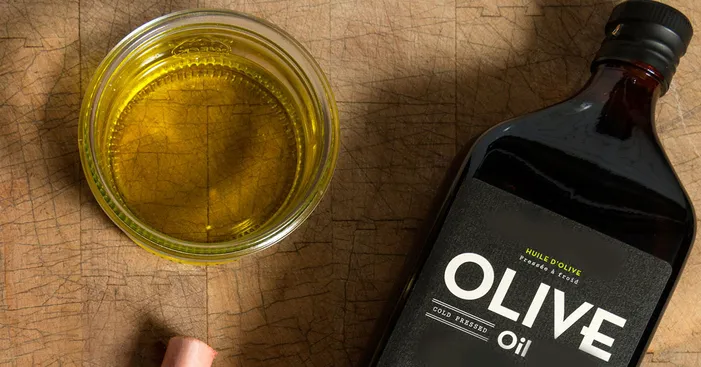
Are you looking for a healthy vegetable oil that is packed with antioxidants and beneficial fatty acids?
Look no further than cold–pressed olive oil!
This versatile oil can be used for a variety of ways, from kitchen recipes to homemade beauty & care remedies. .
Not only is it incredibly healthy, but it also adds a delicious flavor to your food.
Read on to learn more about the amazing benefits of cold–pressed olive oil!
General facts about cold pressed olive oil:
Olive oil: historical overview

This oil comes from the fruits of the Olea Europaea which grows across the regions of the Mediterranean basin.
It is an “evergreen” tree as it doesn’t lose its leaves during Fall and Winter and they remain shiny and green.
These trees can live more than 2000 years which explains why it is omnipresent in Greek, Carthage, and Rome Mythology as a symbol of wealth.
The first cultivars date back 4000 ago and they were found in Syria, Phenicia, Palestine, and Greece.
In Greece mythology, they used to believe that Athena, the Goddess of wisdom, created the most useful tree for humanity which can nourish and heal.
Several years after, Greecs planted olive trees in Sicily and Marseille while Phenicians planted them in southern Spain and North Africa.
Across all the ancient great cultures people used cold pressed olive oil as an essential ingredient in their diet and medical remedies
During the reign of the Roman Empire, it was estimated that more than 30 million olive oil jars were exported worldwide.
Nowadays, there are hundreds of cultivars of the Olea Europeae tree and they produce different olive shapes and flavors including:
- Maroccana in Morocco.
- Chemlali in Tunisia.
- Arbequina in Spain.
- Coratina in Italy.
Cold pressed olive oil: the extraction technique

Ever since the first millennium, the “first cold press” was used to extract oil from olives and other fruits and seeds.
The process didn’t change much since then and it’s done by:
First step:
- Collecting, sorting, and washing the olives.
- Crushing the olives by pressing them using millstones.
This results in an olive paste made from skins, pulps, oil, and water.
In the second step:
The olive paste is pressed for a second time to separate liquids (water + oil) from residues.
Final step:
The liquid obtained goes through a decantation phase where the oil gets separated from the water.
Generally, it takes about 11 lbs of olives (5 kg) to obtain 1 liter of “cold pressed olive oil”.
How much olive oil to consume per day?
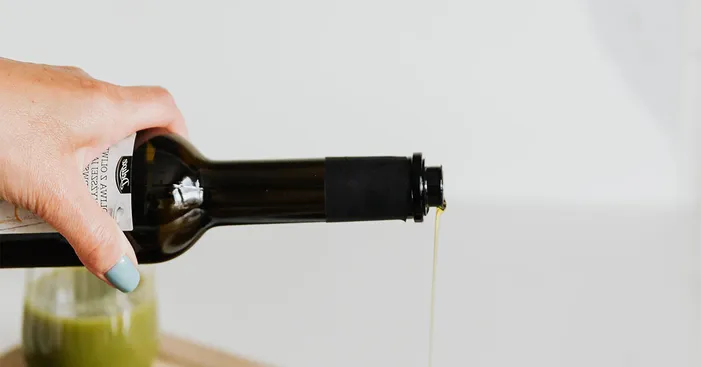
Even though the consumption of cold pressed olive oil is very beneficial, it is still fat and needs to be consumed moderately.
As a general rule, it is recommended to consume no more than 3 to 4 tablespoons of olive oil per day.
It is not an ingredient that we should count on it on its own but rather consume as part of a balanced diet.
Cold pressed olive oil nutritional values and health benefits:
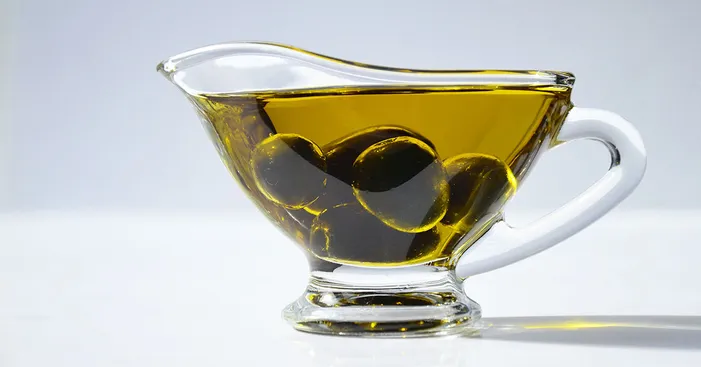
Nutritional values:
Olive oil is essentially made from fatty acids both monounsaturated (omega 9)and polyunsaturated (omega 3 & 6).
However, the composition of these fatty acids depends heavingly on the way it was extracted.
Cold pressed olive oil contains:
- 76% Monounsaturated fatty acids (omega 9).
- 13% Saturated fatty acids.
- 9% Polyunsaturated fatty acids (1% omega 3, 7% omega 6).
- Vitamins A, D, E, K…
- Phytosterols.
Health benefits:
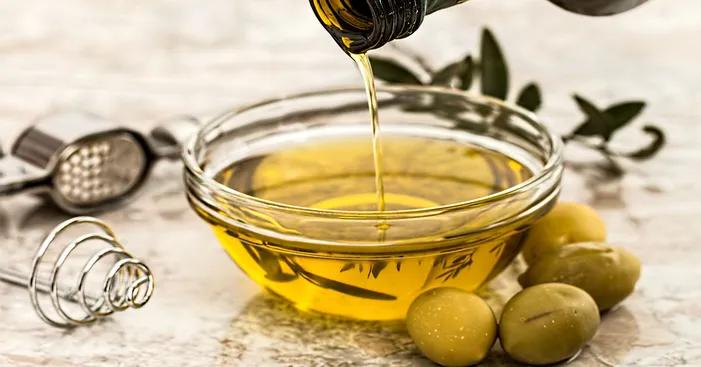
In the countries where olive oil is consumed regularly, such as Spain or Italy, life expectancy is higher than in the rest of the world.
Life expectancy is mainly affected by overall health so here’s how cold pressed olive oil can boost health:
Lowers bad cholesterol:
Even though most people think that we need to get rid of all sorts of cholesterol, this is wrong and even dangerous.
In fact, there are good types of cholesterol LDL (low-density lipoprotein), and bad types of cholesterol HDL (high-density lipoprotein).
The LDL cholesterol is a necessary element that our bodies need to create hormones, bile acids, the membrane of the cells…
Oppositely, HDL cholesterol promotes plaque buildup in the arteries which increases the risk of cardiovascular diseases like thrombosis and strokes.
The good thing about cold pressed olive oil is that it can increase the level of LD cholesterol while promoting the decrease of HDL cholesterol.
To further promote a good balanced healthy diet with good LDL cholesterol levels and low bad cholesterol we need:
- Olive oil.
- Lean meat.
- Steamed or raw vegetables.
- Fruits.
- Fibers.
- Legumes like lentils, peas…
Calms down joint pain:
Even though olive oil doesn’t seem like it could be the best painkiller for joint pain, science says otherwise.
In fact, many studies show that this oil has great anti-inflammatory properties which can reduce the pain of arthritis.
This is mostly due to the oleocanthal content which is also the one responsible for the strong fragrance of this oil.
For instance, several researchers have confirmed that 4 tbsps of cold pressed olive oil is equal to 200mg of ibuprofen.
Nonetheless, this oil is a natural analgesic compared to the drugs and comes with very less side effects.
Promotes heart health:
As the common cause of death worldwide, heart disease is less common in Mediterranean countries.
This fact has opened the doors for much research on the Mediterranean diet which concluded that olive oil reduces the risk of heart disease by:
- Preventing bad cholesterol from oxidation.
- Reducing inflammation.
- Lowering blood pressure.
- Reducing the risk of blood clots.
Reduces the risk of cancer:
More than 40 studies were published between 1990 and 2010 to learn about the relationship between olive oil and cancer.
These studies involved more than 13,800 patients and it was concluded that those who consume olive oil regularly had -59% less risk of cancer.
Some other studies show that oleocanthal, one of the many polyphenols of olive oil, can kill certain types of cancer.
It starts by destabilizing the lysosomal membrane which only provokes ruptures in the cancerous cell membrane and not the healthy ones.
Can prevent Al-Zheimer:
According to scientists, olive oil is a great source of many beneficial compounds that can reduce the risk of Alzheimer’s and its symptoms.
This is due to the presence of polyphenols and oleuropein aglycone which can reduce the formation of plaque in the brain.
In addition, the oil contains another polyphenol called hydroxytyrosol which can neutralize the oxidative stress damage of neurons.
Thanks to these substances, regular consumption of olive oil can:
- Reduce inflammation in the brain.
- Preserves the memory.
- Eliminates toxins and plaque buildup in the brain.
Protect against bacterial infections:
Cold pressed olive offers many nutrients that are capable of protecting us from bacteria and harmful parasites.
Several studies show that this oil has monounsaturated fatty acids and phenolic compounds that can eliminate bacteria.
For instance, these compounds can eradicate Helicobacter Pylori bacteria which can cause stomach cancer.
In fact, a study concluded that consuming 3 tbsps of olive oil daily for two weeks can eliminate Helicobacter pylori bacteria for 40% of patients.
Full of antioxidants:
Cold pressed olive oil has great antiaging effects thanks to its antioxidants including phenolic compounds, vitamin E, and tocopherols…
These plant compounds are capable of protecting the body from premature aging by eradicating free radicals.
These harmful compounds damage the DNA and even promote the growth of cancerous tumors.
Consuming olive oil, the natural virgin type, would neutralize the effect of free radicals which extends the lifespan of cells.
Precautions before you use cold pressed olive oil:

Could provoke acne:
The excessive use of this oil can increase the risk of acne because it is thick and its absorption is slow.
Therefore, it creates a thick layer that can clog skin pores and trap all the dust and dirt.
Because of that, it is best to use olive oil on the skin no more than 2 times a week.
May cause skin rash:
As mentioned above, the use of olive oil should be limited especially with skins that are oily in nature.
Once olive oil combines with sebum, it may cause severe irritation and redness of the skin.
Drops blood sugar levels:
Cold pressed olive oil can substantially reduce blood sugar levels below normal levels which increases resistance to insulin.
With overconsumption of olive oil, the body could be at risk of chills, weakness, hypoglycemia…
Can increase calorie intake:
Like most oils, excessive consumption of olive oil can increase calorie intake which promotes weight gain.
The recommended maximum dose of this oil (4 tbsps) contains more than 400 calories which are more than 20% of the daily needs.
Full of saturated fats:
With a daily serving of 4 tbsps, olive oil offers around 40% of the daily needs in saturated fats (7.4g).
This is a big amount coming from this ingredient alone, and it even exceeds the number of saturated fats in 4 oz of chicken breast.
Because of that, people who are dealing with/at risk of heart attack, obesity, and atherosclerosis should avoid consuming this oil.
May cause diarrhea:
Just like other oils, overconsumption of any oil including olive oil may lead to diarrhea.
This is thanks to the lubricating effect of this ingredient which is beneficial in case of constipation.
Because of that, those who are dealing with diarrhea should avoid consuming olive oil and any other vegetable oil.
Could cause allergic reactions:
Even though this is very rare but some people are allergic to olive oil.
Once they consume this oil, these people may experience eczema, contact dermatitis, and breathing difficulties.
These allergic reactions can even occur once the allergic person consumes a certain food that is made with olive oil.
However, this type of allergy is extremely rare but if you experience any of the above symptoms make sure you consult your doctor.
Using cold pressed olive oil:
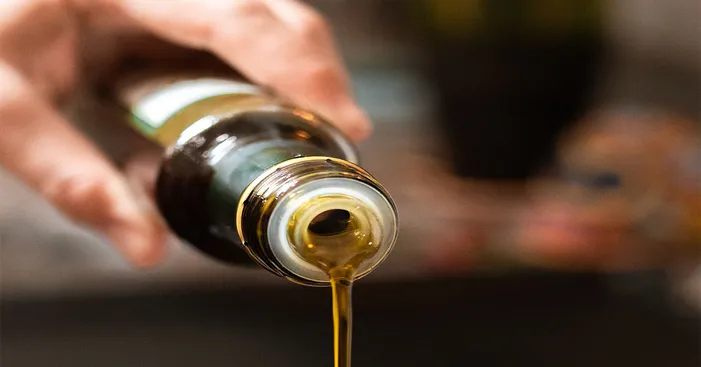
To get all of the virtues of olive oil, the best way is to consume it raw that way it will retain all of its nutrients.
Based on that thought, the best way is to add olive oil in a light cooking recipe that doesn’t involve high temperature or even after cooking.
However, when it comes to frying and cooking methods that require high temperatures we should use another vegetable oil.
This is because when cold pressed oils are subjected to high temperatures they release toxic compounds.
Each vegetable oil has its smoking point where chemical transformation starts.
As for refined olive oil, it may have a high smoking point which makes it suitable for frying.
Nonetheless, this doesn’t apply to cold pressed olive oil as it doesn’t support extremely high.
In fact, high temperatures can inactivate the nutrients (especially the vitamins) in cold pressed olive oil.
Try to use this oil in milkshakes, cocktails, smoothies, and salads, on top of any food as a garnish…
You can also use cold pressed olive oil to preserve other ingredients like jams, yogurts, and other dairy products.
Cosmetic usage:
This oil is omnipresent and is used in the cosmetic industry in creams, detergents, lotions, and general body and hair care products.
Such products, enhance their composition with olive oil to exploit its natural soothing and moisturizing effects.
This is good news because if companies use it in their products we can use it in its natural state in our home remedies.
In many countries across the Mediterranean, women use olive oil directly on their hair as an overnight mask and then wash it the next day.
They do that for 3 to 4 consecutive days to completely get rid of dandruff and make the hair strong and shiny again.
Not just the hair, you can also apply cold pressed olive oil directly on the skin to nourish it and hydrate it
It is very beneficial to use on the stomach during pregnancy as it enhances skin elasticity which can prevent stretchmarks.
Also, this oil can be used on its own to fight acne and restore blood circulation around the eyes to avoid “panda eyes”.
To do that simply put a few drops of olive oil on a cotton and pass it on to the acne and around the eyes.
Finally, thanks to its antioxidant properties, you can use olive oil on the skin after sun exposure to protect your skin from UV radiation damage.
Buying olive oil:
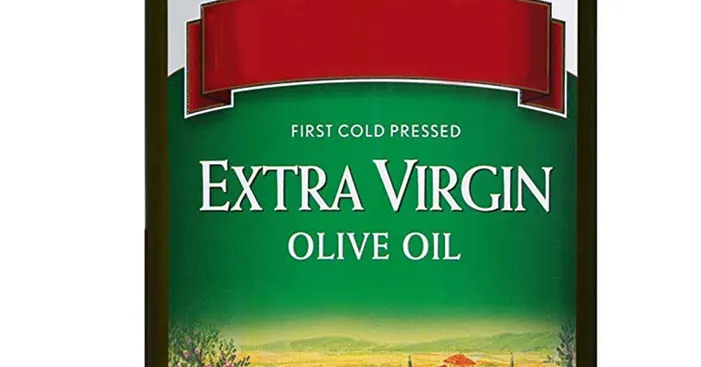
To buy good quality olive oil, there are many factors that you need to know.
However, the most important factor is the acidity level which represents the presence of free oleic acid.
To understand this better, due to degradation some fatty acids may have molecules detached from their main structure and become free.
In other words, the lower the acidity level the better the quality of the olive oil.
Also, this means that having many free oleic acid molecules in the oil means that the olives were not optimal.
It could be due to low sanitary treatment before harvesting, poor storage conditions, or the fruits being too ripe.
In the market, they use tricky technics by using the word “virgin” to indicate the quality of the oil.
Well, there is a huge difference between “virgin” olive oil and “extra virgin” olive oil:
- Virgin olive oil: Usually has an acidity level of < 2%.
- Extra virgin olive oil: Has an acidity of less than < 0.8%.
In addition, try to avoid labels that indicate “Europe” as the place of production because that means it’s a mix of oils extracted in different ways.
Cold pressure is by far the best extraction method as the process is purely mechanical without additives.
Because of that, the main factor of good quality olive oil is the way it was made, and “cold pressed olive oil” is the best quality in the market.
Storing olive oil:
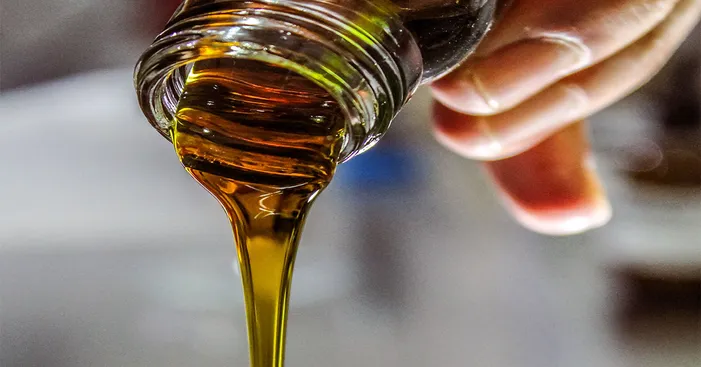
While thinking of the storage condition best suited for olive oil is to keep it away from temperature, light, and humidity.
In fact, cold pressed olive oil tends to solidify if it is stored under 53°F (12°C) but the nutritional composition remains intact.
The nutrients in this oil only start to deteriorate below 32°F (0°C) and above 68°F (20°C) where it starts to go rancid.
In addition, this oil must be kept away from light (even artificial lights) which can affect its composition, color, and taste.
Based on that, dark containers (opaque), kitchen pantries, cool places, and closed cabinets can protect olive oil from rancidity.
However, those are not the only bad conditions because contact with oxygen promotes fatty acid oxidization.
This could change the nutritional composition of the oil therefore poorly sealed or half-empty containers can promote rancidity.
Combining all these harmful conditions, we conclude that the best way to store olive oil is away from oxygen, temperature, and light.
Also, the container should be made of certain material that doesn’t react with oil nor release substances that alter the chemical composition of the oil.
The best materials for olive oil containers are the ones made from dark glass, tin, and stainless steel.
Thus, we suggest that you store olive oil in a dark glass sealed bottle and keep it in the pantry away from temperature and light.
If stored properly, cold pressed olive oil can keep its nutritional composition and aroma/flavor for up to 15 months.
However, through time the oil tends to lose its fragrance and color over time so freshness is also a crucial key to the shelf life.
